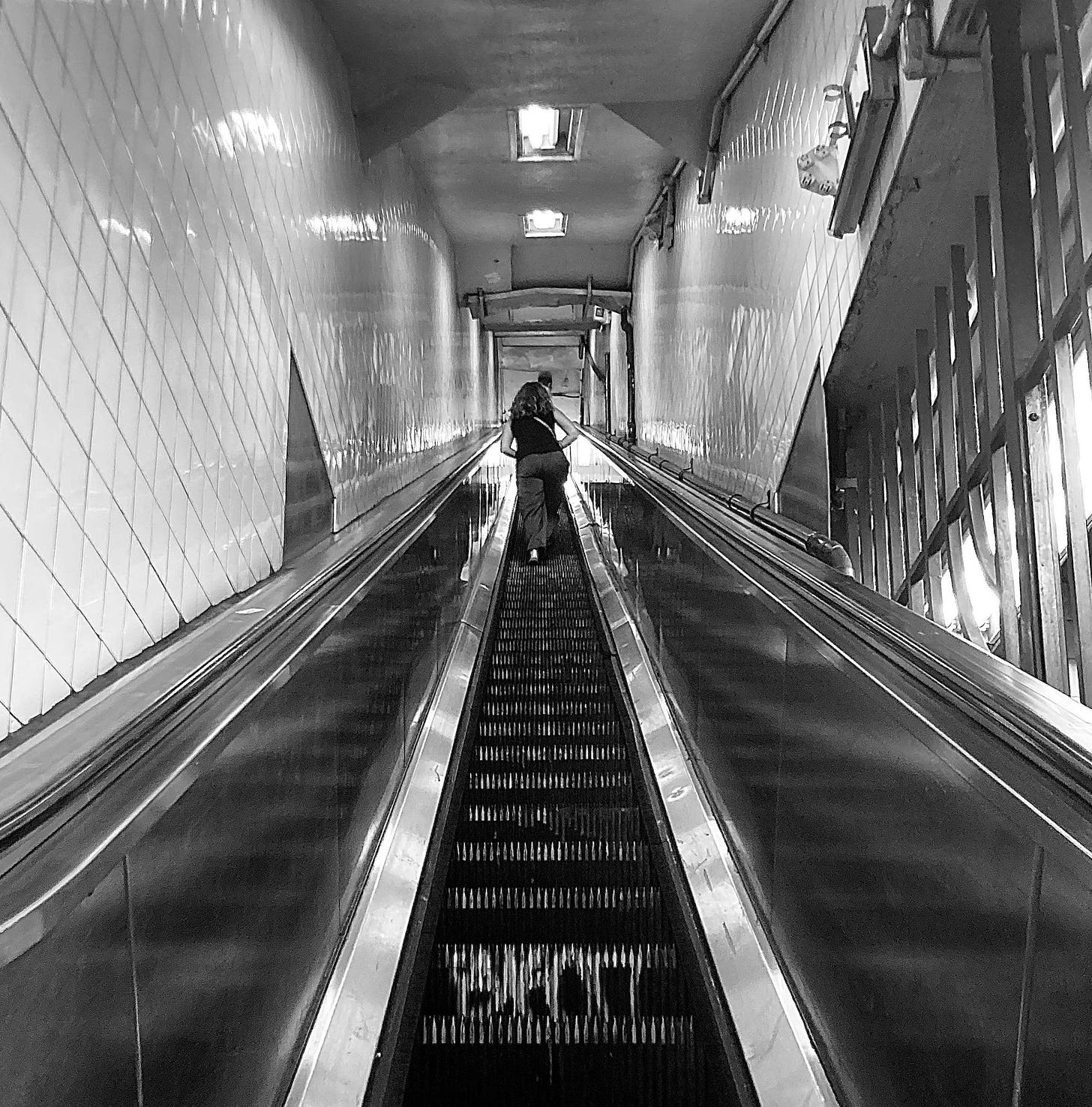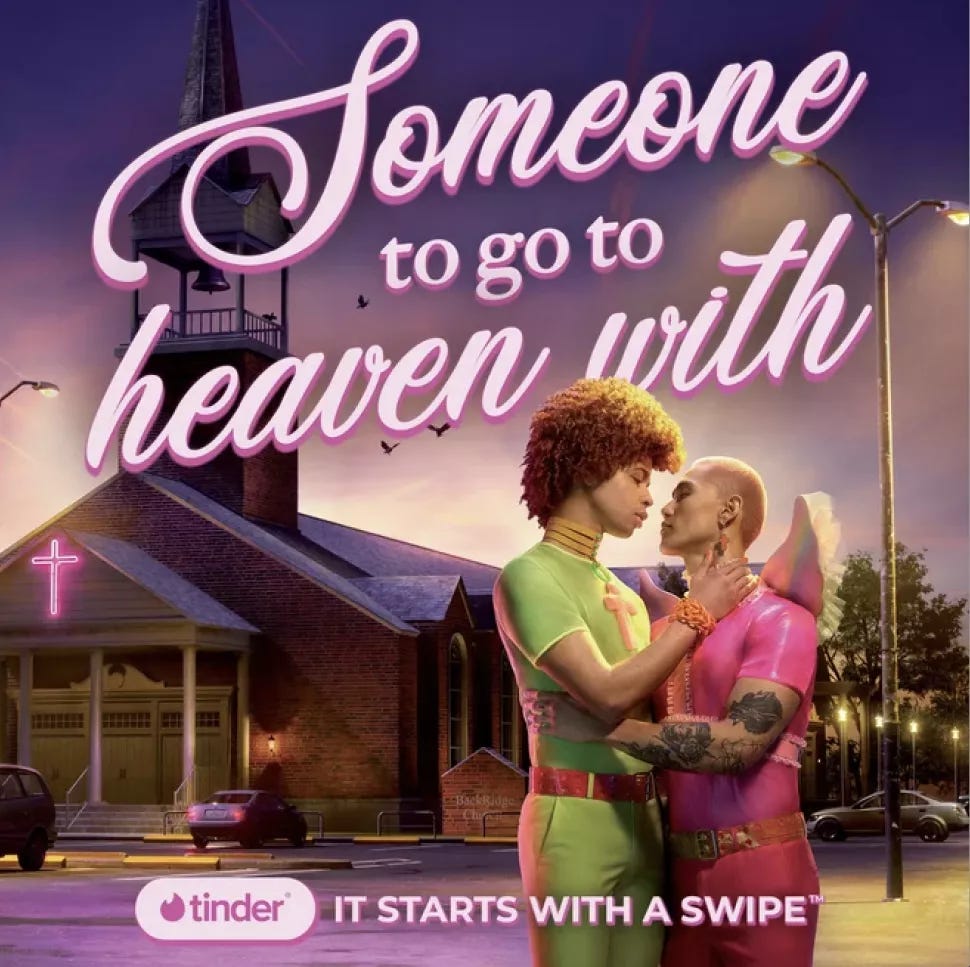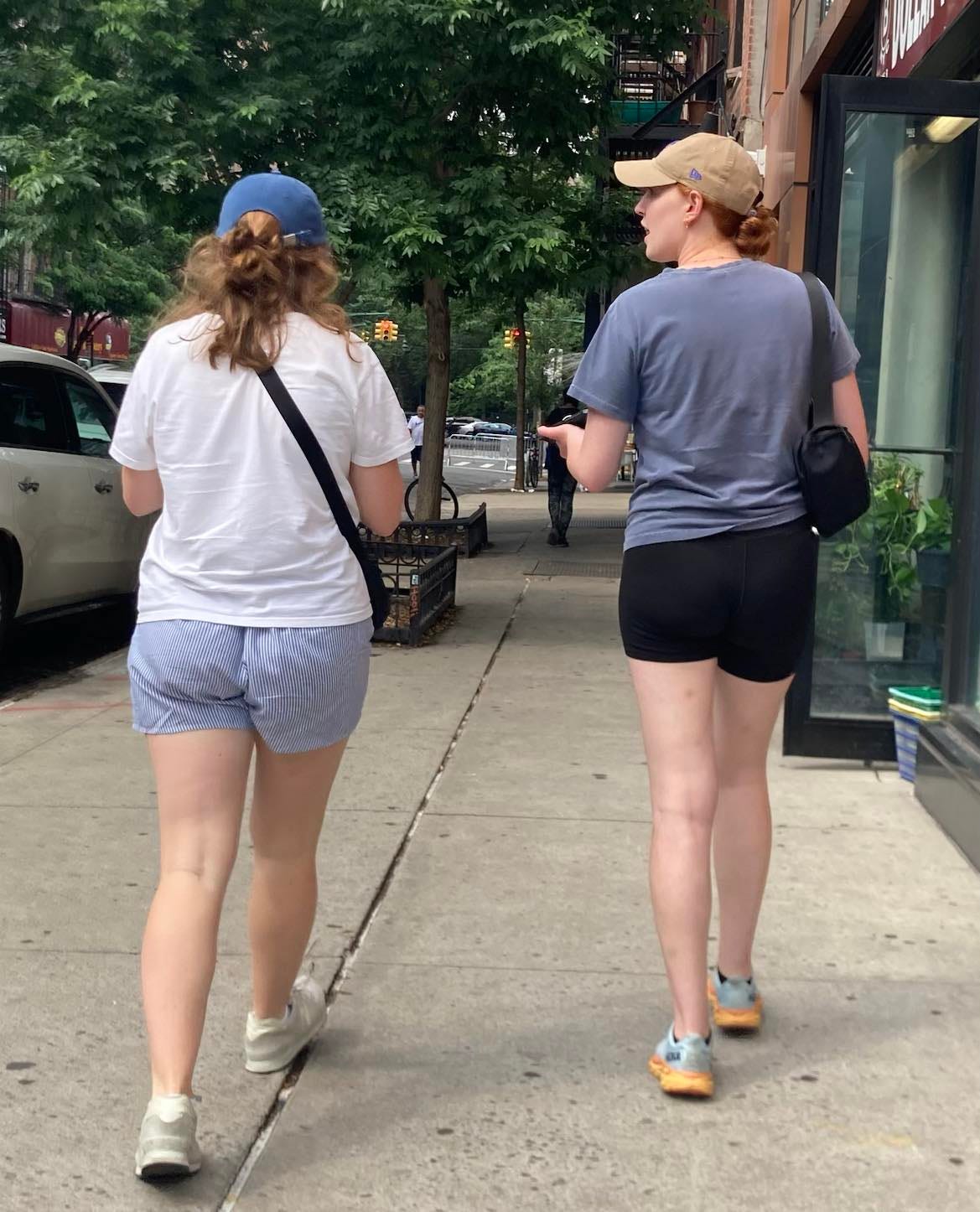John and I were on the subway a few days ago reading Tinder ads in a kind of awestruck amazement. You remember Tinder, right? It’s a dating app where you swipe right or left to “like” or “ignore” matches the app suggests for you. Our subway car was awash in hot pink Tinder ads full of trendy, gender-fluid Zoomers in retro vehicles, smooching beneath captions like, “Realizing you’re not dead inside” or “Proving astrology right.”
As an ad campaign, it’s brilliant. The maximalist pop aesthetic makes you look twice, especially the neon color palette and bizarre George Jetson vinyl jumpsuits. But it is so decidedly meant to appeal to a youth demographic (were they aiming for Gen Xers like me, they would have had to use captions like “It’s probably better that you don’t die alone”), and when I looked around the subway compartment, it struck me that John and I were the oldest people in there. By a lot.
Our neighborhood in the East Village is bursting with Zoomers and young Millennials (your so-called “geriatric” Millennials all work for Google and live in Cobble Hill.) All the white ones adhere to a strict dress code: baseball cap with hair pulled through the back, white socks, dirty running shoes, unflattering shorts, and a T-shirt with the name of a university emblazoned across the front, not even necessarily an alma mater. Girls clutch iPhones in one hand and to-go coffees in the other. Sometimes they walk a leashed dog whose name is Luna, Molly, or Bear. They are always, always, always on their phones, ear pieces flashing, voices raised to a fever pitch of indignation over the guy they stopped seeing, what he said, what he failed to say, how they’re not understood or appreciated, or how their very part-time work isn’t fully remote anymore, so they’re quitting.
There’s a lot of upspeak. Upspeak is a pattern of intonation some people have (particularly young white and some Asian women) with a high-rising terminal, in which every declarative statement (e.g., “I called him today”) becomes an interrogative one (e.g., “I called him today?”)
To this Gen Xer’s ears, they sound like unbelievable ninnies.
To them, I barely exist. During our brief interactions, they tend to view me with bemused expressions, as though they can’t quite figure out what I’m doing here. And they’re not wrong. New York is an old city full of young people. The average age is 36. In Italy, it’s 46—a demographic that’s a better fit for me. Anywhere we went in Italy, I was the same age or younger than most of the people I interacted with.
Here, I’m Cretaceous.
You have to ask yourself why so few people over the age of fifty are in this city. Do they all migrate up to the Hamptons or down to Florida? Apparently, the answer is yes. According to New York State government statistics, only 12.3% of the city’s population is between the ages of 45-54. People between the ages of 55-59? A mere 6.2%. We mid-lifers have either been hunted for sport, or we all sobered up, saw that the party was over, and emigrated to a city that didn’t require so much damn walking.
John dragged me to a bar a week or so ago called The Red Lion, a fixture in the West Village that showcases some truly spectacular music. No slight intended to Italy, but it is difficult to find music at this level anywhere except Manhattan. The horn section alone was tighter than a gnat’s ass, and the whole band swung like a hammock in a gale-force wind. I sat there in my sensible footwear, sipping my sparkling water, and chair-dancing with the best of them.
Then I got to witness first-hand how Zoomers do a music venue. It was an eye-opening experience. First, they’re all absurdly beautiful. Young people have two advantages over the rest of us: boundless energy and perfect skin. That skin glowed in the reflective lights of the stage. I couldn’t help but marvel.
The weird thing is—and I remember this from my own misguided youth—they don’t know they’re beautiful. It was obvious, at least to me, these young women were insecure and unhappy, cocktails in hand, bumping and grinding on the dance floor. At one point, photos were taken, the tight-skinned girls giggling, arm in arm, the band merely a hazy suggestion in the background. Then they stopped dancing to inspect the photo, huddled together with the gravity of surgeons assessing an amputated limb.
There was a dissenter. The dissenter was told she looked great, no one would notice whatever imperfection she’d found with her hair, her outfit, her poreless skin. So, another photo was taken, this one so close to the stage, the lead singer had to take a step back.
This new photo seemed to pass muster with all the girls, who busied themselves posting it to their social media apps, thumbs flying as they added hashtags: #WestVillage #BFF #DanceParty #MessyHairDontCare.
For me, it was unsettling to watch these young women performing girl-power messages and fun-party-you’re-never-getting-invited-to vibes for whatever unseen audience lurked behind the shiny black mirrors of their phones.
In social media parlance, it’s called “thirst trapping”—posting purposely alluring photos meant to elicit desperate thirst in the viewer. Their message was obvious: Look at me, I’m fabulously hip, I have all these friends, and while you’re trawling a mall in Weedhole, Oklahoma, looking for a Cinnabon, I’m living my Barbie Dreamhouse life in New York City.
But it’s actually far more disturbing than that. They may call it thirst trapping, but I call it “Restaurant Window Syndrome.” Imagine not eating for three days and then pressing your face against a restaurant window and watching other people eat. And that’s social media. Everybody’s life looks better than yours. And maybe you try to compete, maybe you try to keep up by posting photos of how perfect your life is, but you know the truth. Most of your life isn’t perfect or even that photo-worthy. It’s full of ups and downs, just like everybody else’s. So, you keep staring obsessively at your phone screen, your own private restaurant window, desperately wishing you were as happy and thin and rich as the people you see, which is exactly why social media has such a deleterious effect on the mental health of the young.
So many of these kids are the progeny of wealthy, flyover-state parents who send their spawn to Manhattan for a big college adventure. You can tell because they have zero concept of money or the cost of things. They just whip out Daddy’s credit card and go tap, tap, tapping their way through expensive coffee bars, restaurants, and Anthropologie stores. I’m no economist, but I can’t imagine this being sustainable. At some point in the not-too-distant future, that mountain of debt is going to collapse on us, and we’re all going to die.
Make no mistake: I’m not criticizing young people. I have great love for this generation, especially since I’ve got two kids who belong to it. Nor am I suggesting that these parents are doing anything wrong. What I am saying is that times have changed and few parents have the time or the bandwidth to keep up with those changes. Until we start paying our own bills, we never grow up; instead, we remain in a state of arrested development where tough decisions are always hazily deferred and there’s a weed store around every corner.
Boy, does this make me sound cranky. I don’t mean to be. And I begrudge no one their privilege (or their weed), seeing as I do that even those who lead advantaged lives suffer many of the same problems we poors do. Additionally, it’s flyover-state money that’s keeping countless bars, restaurants, and jazz clubs afloat in NYC. But they’re also keeping rent costs astronomically high. I do worry what’s going to happen—indeed, what is already happening—after AI scythes through the tech industry, eliminating hundreds of thousands of (mostly Millennial) jobs. That’s going to be a problem that no one will want to address.
I just want young folks to be happy, and I don’t think they are. Most come across as wildly smart but super neurotic. Or maybe we’re all neurotic, and they’re the only ones who are honest enough to admit it. I’m not sure they’re actually thinking for themselves. Some of these twenty-something dudes are so busy being bro-ey and contrarian, they don’t realize that kneejerk contrarianism is itself a type of conformity.
Maybe we should just loop back to my original idea, which is that I, with my sensible shoes, drugstore cheaters, and sad addiction to word puzzles, am simply old?
I’d be proud to admit it. Every candle I put on my birthday cake is another year this world has failed to kill me.
Copyright © 2023 Stacey Eskelin
Have some thoughts? The comments section is below.







Try going into any professional sports locker room. I feel like Methuselah. "Tell us about Radio Shack, grandpa." Life in the (metaphorical) big city.
I, too, request that you leave my lawn.
I LOVE the Red Lion! GREAT semi-divey place for good music, drinks, decent pub food. And in a fab neighborhood to boot. Glad you guys discovered it!
I lived in NYC in my 20s, 40s, and now in the last few minutes of my 50s...basically half my life...and have ALWAYS loved it - every minute of it. I've been incredibly lucky, though there certainly have been dicey financial moments (I left in my mid-20s with $12 to my name); time on unemployment/Medicaid (thank god for both)...but somehow I've always bounced back, sometimes seemingly from the brink. My life the past several years has been rather tranquil and serene, the pandemic giving me my years-long dream of working remotely, and I have THE best job I've ever had.
My closest NYC friends are a decade/decade-and-a-half younger than me; I've never felt "old" here. I've been truly blessed in this city, and when I leave later this year to relocate to my home state (OH), it'll be incredibly bittersweet. I'll be facing some not-so-tranquil days, I'm sure, as I'll be there in part to assist my elderly mother. But starting a new chapter with my partner, so that's the sweet part.
I hope you and John continue to explore NYC and all it has to offer - it's a hard city to live in, but my god, it's fantastic.
Hugs from Astoria...